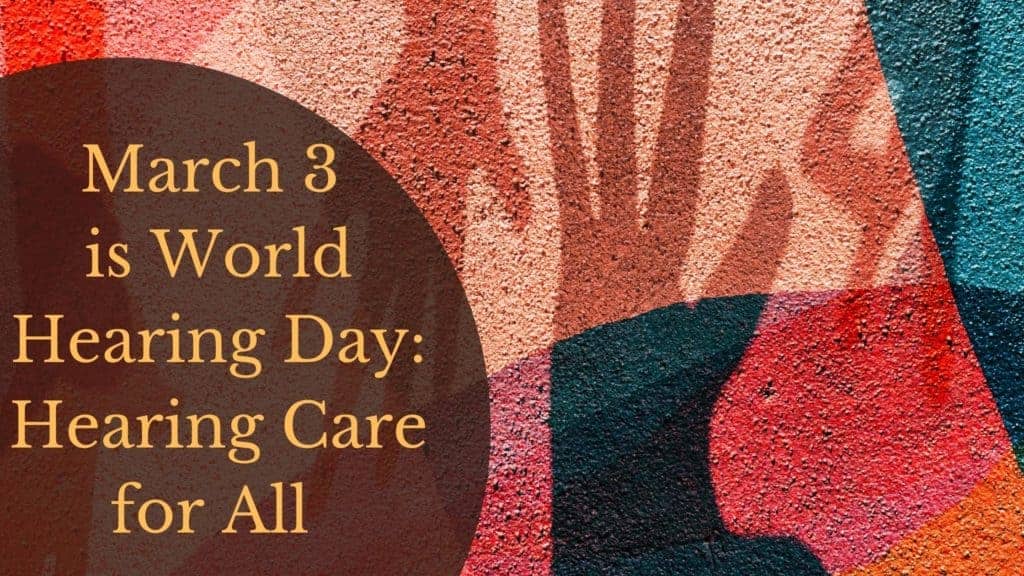
- Signs Your Earwax Buildup Needs Professional Attention - May 29, 2025
- A Step-by-Step Look at How Hearing Aids Make Sounds Sharper - May 5, 2025
- Causes of Conductive Hearing Loss? - April 27, 2025
World Hearing Day takes place every year on March 3. It’s an initiative by the World Health Organization that aims to increase global awareness of hearing loss and hearing health. The theme for World Hearing Day 2021 is “Hearing care for ALL! Screen. Rehabilitate. Communicate.” This year, World Hearing Day is a call to action, asking policymakers and individuals to find out more about hearing loss, and promote hearing care for everyone. This includes people of all ages, and people around the world.
Who Has Hearing Loss?
More than 50 million Americans have hearing loss. You may think most of these individuals are seniors, but that’s not the case! Millions of younger Americans also have a hard time hearing. Even children and teens have hearing loss due to genetic factors or from exposure to dangerously loud noise. Hearing loss affects everyone, and World Hearing Day is the perfect time to talk about hearing loss.
Learn About Noise-Induced Hearing Loss
A common cause of hearing loss among children, teens, and adults is noise-induced hearing loss. Very loud noises in your environment can damage your ears and cause hearing loss. A number of everyday activities can lead to hearing loss. For example, mowing the lawn, cranking up the volume during your fitness class, or using your kitchen appliances can damage your hearing. Louder leisure activities include attending concerts and sporting events, or watching a fireworks show.
Any of these activities can cause hearing loss. A good rule of thumb is to try talking to the person next to you. Did you have to shout to get your point across? Then it’s too loud, and you’re risking your hearing health.
Protecting Your Hearing
Whenever you’re on a loud jobsite or you’re doing loud leisure activities it’s important to protect your hearing. World Hearing Day is a great time to learn all about hearing protection. There are a number of ways you can protect your hearing. First, try to remove yourself from the noise, or turn down the volume. If you can’t do that, then put in earplugs.
Foam or wax earplugs are great for moderately loud noise. They’ll reduce the volume enough to prevent hearing loss. These earplugs are also very lightweight so you can carry them with you everywhere. Best of all, they’re inexpensive, so you can have several pairs with you, and offer them to your friends as well.
Earmuffs are perfect for very loud noise. If you’re going to the shooting range or to watch the fireworks, this hearing protection will block out harmful noise. They’re also the right choice for noisy job sites, or anytime you need to wear hearing protection all day.
Digital hearing protection is the right option for any activity that’s very soft and suddenly very loud, like hunting, or playing in a band. The digital devices won’t muffle soft sounds, but they will protect your ears from dangerously loud noise.
Why It’s Important to Treat Hearing Loss
Regardless of age, it’s important to hear clearly. Children and teens with hearing loss will have a hard time learning along with their hearing peers. Young adults with hearing loss struggle at work, get overlooked for promotions, and even risk being fired. And adults of all ages feel the effects of poor communication. When you can’t hear clearly, it’s difficult to have conversations with loved ones. You may stay away from social events and find yourself isolated and lonely. Hearing loss makes it hard to connect with the people you care about the most.
Treating hearing loss will help you hear what’s being said. You won’t strain to hear, or constantly ask people to repeat themselves. With quality hearing aids you can get back to living life on your terms.
Celebrate World Hearing Day with Us!
World Hearing Day is an opportunity to learn more about your hearing. Visit us for a hearing test and find out exactly what you can hear, and what sounds you can’t hear. If you don’t have hearing loss, this baseline hearing test gives you a close look at your unique hearing profile. If you have hearing loss, we’ll recommend the best treatment option to help you hear all the sounds around you.
